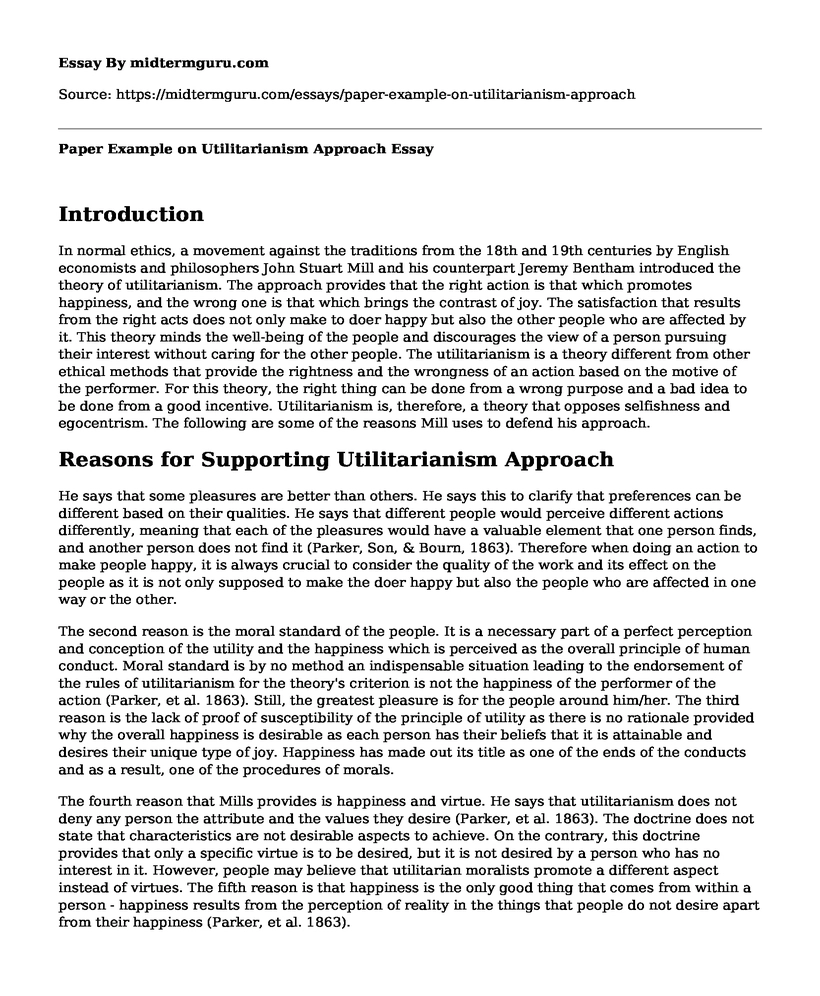Introduction
In normal ethics, a movement against the traditions from the 18th and 19th centuries by English economists and philosophers John Stuart Mill and his counterpart Jeremy Bentham introduced the theory of utilitarianism. The approach provides that the right action is that which promotes happiness, and the wrong one is that which brings the contrast of joy. The satisfaction that results from the right acts does not only make to doer happy but also the other people who are affected by it. This theory minds the well-being of the people and discourages the view of a person pursuing their interest without caring for the other people. The utilitarianism is a theory different from other ethical methods that provide the rightness and the wrongness of an action based on the motive of the performer. For this theory, the right thing can be done from a wrong purpose and a bad idea to be done from a good incentive. Utilitarianism is, therefore, a theory that opposes selfishness and egocentrism. The following are some of the reasons Mill uses to defend his approach.
Reasons for Supporting Utilitarianism Approach
He says that some pleasures are better than others. He says this to clarify that preferences can be different based on their qualities. He says that different people would perceive different actions differently, meaning that each of the pleasures would have a valuable element that one person finds, and another person does not find it (Parker, Son, & Bourn, 1863). Therefore when doing an action to make people happy, it is always crucial to consider the quality of the work and its effect on the people as it is not only supposed to make the doer happy but also the people who are affected in one way or the other.
The second reason is the moral standard of the people. It is a necessary part of a perfect perception and conception of the utility and the happiness which is perceived as the overall principle of human conduct. Moral standard is by no method an indispensable situation leading to the endorsement of the rules of utilitarianism for the theory's criterion is not the happiness of the performer of the action (Parker, et al. 1863). Still, the greatest pleasure is for the people around him/her. The third reason is the lack of proof of susceptibility of the principle of utility as there is no rationale provided why the overall happiness is desirable as each person has their beliefs that it is attainable and desires their unique type of joy. Happiness has made out its title as one of the ends of the conducts and as a result, one of the procedures of morals.
The fourth reason that Mills provides is happiness and virtue. He says that utilitarianism does not deny any person the attribute and the values they desire (Parker, et al. 1863). The doctrine does not state that characteristics are not desirable aspects to achieve. On the contrary, this doctrine provides that only a specific virtue is to be desired, but it is not desired by a person who has no interest in it. However, people may believe that utilitarian moralists promote a different aspect instead of virtues. The fifth reason is that happiness is the only good thing that comes from within a person - happiness results from the perception of reality in the things that people do not desire apart from their happiness (Parker, et al. 1863).
Conclusion
The doctrine of utilitarianism has its foundation on ensuring that the happiness of the other people comes before one's interest. This theory discourages selfishness and encourages selflessness, which is an essential aspect of ensuring that there is respect for other humans and that their interests are paramount. It also provides the reasons why it is applicable to enhance ethics at various levels of life. The doctrine is therefore vital and for emulation by the people as it discourages egocentrism and encourages putting the interest of the other people before our interests.
Cite this page
Paper Example on Utilitarianism Approach. (2022, Sep 12). Retrieved from https://midtermguru.com/essays/paper-example-on-utilitarianism-approach
If you are the original author of this essay and no longer wish to have it published on the midtermguru.com website, please click below to request its removal:
- Apology of Socrates by Plato
- Mid Term Questions on Globalization: Marx, Giddens, Weber
- How Two Different Theorists Marx and Weber Would Explain the Same Article
- Essay Sample on Marx's Theory of Capitalist Exploitation
- Socrates on Moral Decisions Essay Example
- Plato: Advocating Morality, Righteousness, and Justice - Essay Sample
- Moral Philosophy: Examining Right and Wrong in Existence - Essay Sample







